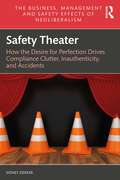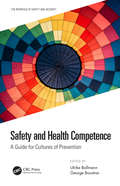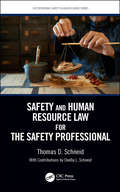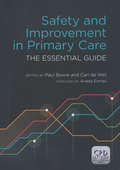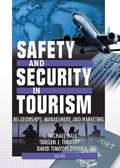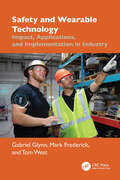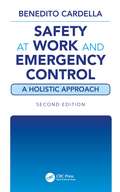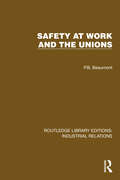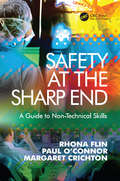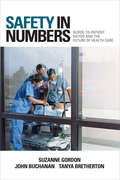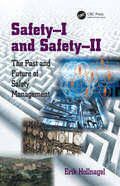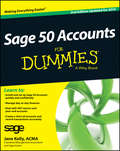- Table View
- List View
Safety Professional's Reference and Study Guide, Fourth Edition
by W. David YatesFor safety professionals navigating the complexities of safety practices daily, the search for a single-source guide covering diverse topics has been an ongoing quest. Now, in its fourth edition, Safety Professional’s Reference and Study Guide has expanded its scope, incorporating crucial new chapters on legal aspects of the safety profession, recordkeeping, sustainability principles, and more, catering to the evolving needs of the Environmental Health and Safety (EHS) community.This title is every safety professional’s indispensable, market-leading resource, empowering the reader to tackle challenges with confidence and expertise. Exploring core aspects of occupational safety, this book offers a wealth of knowledge, each chapter offering practical insights and actionable advice. The title goes beyond conventional boundaries, addressing emerging topics such as electrical safety, risk assessment, and sustainability principles in brand-new chapters.A go-to guide for any practicing safety professional seeking a quick desk reference, a student supplementing their textbooks, or a candidate preparing for certification exams including ASP, CSP, OHST or CHST, it equips readers with the knowledge and skills needed to navigate the evolving landscape of occupational safety focusing on real-world applications and exam readiness.
Safety Protocols in the Food Industry and Emerging Concerns
by Giovanni GurnariThis brief reports about safety protocols in the food producing industry. Hygiene, i. e. , the prevention of contamination and microbial infections, is of greatest importance in the industry, as are disinfection techniques, to prevent or to fight microbial contaminations and infections, and practical emerging concerns are centered around these fundamental concerns. The first part focuses on the attempts and possibilities to prevent microbial spreading. Part II discusses disinfection techniques and their risks, advantages and disadvantages. Current industry trends, such as the attempts to substitute chlorine in disinfection, are critically reviewed. In all, this brief volume discusses decision procedures and strategies that are being applied to prevent, reduce and fight microbial spreading. In particular, material that comes into contact with the foods, has to fulfill strict requirements. This aspect is explained in detail, and how little details can have great effects. The brief deals with the important question: is disinfection more an ally or an enemy?
Safety Risk Assessment of Urban Underground Large Space Construction
by Sheng-Xiang Lei Zhong-Sheng Tan Ming-Li Huang Zheng-Quan Ding Ke LeiThis monograph aims to provide theoretical and technical support for construction safety risk assessment in the construction of urban underground large space, since high construction risks and safety accidents frequently occurs in the current development of complex underground spaces in urban areas. The author's team completes the statistical analysis on a large number of typical engineering instances and related accident cases, and proposes the definition of "urban underground large space" and corresponding risk analysis methods. This book starts with analyzing the safety risk characteristics during construction period of urban underground large spaces and establishes a coupling evolution analysis model, then proposes an index system and the quantitative criterion for construction safety risk assessment in urban underground large space, and lastly constructs a dynamic evaluation system on construction safety risk. The book will be an valuable reference for professional engineers, researchers, teachers, and students with an interest in the construction and management of underground spaces. The basis of English translation of this book, originally in Chinese, was facilitated by artificial intelligence. The content was later revised by the authors for accuracy.
Safety Standards and Infection Control for Dental Assistants
by Ellen Dietz-BourguignonInfection Control for Dental Assistants addresses the requirements set forth by the Dental Assisting National Board (DANB) Task Analysis to prepare students for the national Infection Control Examination (ICE). To facilitate instruction and learning the text is broken down into six major areas - Microbiology and Disease Prevention Specific to Dentistry; National Guidelines, Recommendations and Regulations; Infection Control Techniques; Environmental Health and Safety; and Office Communications Regarding Infection Control - according to their relevance to the dental assistant's role in infectious disease prevention. Numerous hands-on procedures and assessment questions are designed to help students track their comprehension and retention of presented material.
Safety Theater: How the Desire for Perfection Drives Compliance Clutter, Inauthenticity, and Accidents (The Business, Management and Safety Effects of Neoliberalism)
by Sidney DekkerHow is it possible that the desire for a perfectly safe world with perfectly safe workplaces helps generate the opposite? Safety Theater shows how our desire for perfection drives compliance clutter, inauthentic relationships with work-as-done, and new kinds of accidents. Written by the leading global voice on safety innovation today, Safety Theater takes us back to the Enlightenment and its aspiration toward a perfectible world through rationality and science, and explains how, by separating severity from injury rates two centuries later, we now hit our targets but miss the point. This hopeful, forward-looking book is the final volume in a three-part series on the effects of "neoliberalism," which promotes the role of the private sector in the economy.Showcasing a more caring kind of capitalism—where free markets are free in a frame; where horizontal coordination replaces hierarchical control; where shareholders are not the only stakeholders; and where value and prosperity are assessed in terms other than merely economic ones—the book platforms much of what is now known as "safety differently," and also allows us to think differently about our capacity to manage complexity (including its possible drift toward failure) and see our fellow human beings as resources for solutions, not as problems to control. Safety Theater introduces the socio-economic success and value system that distinguish Rhineland economies from Anglo ones. It explains how complexity can never be governed through hierarchy and compliance, but necessarily requires trust and horizontal coordination; offers a vision of humanity richer than Anglo-style capitalism can offer; and examines how Rhineland thinking values tripartite consultation (between workers, employers, and government) in ways that can help stem the worst effects of free market policymaking on the compliance clutter and drift into failure, as detailed in the previous two volumes in this trilogy.Sidney Dekker’s work—from his debut Field Guide to Understanding Human Error in 2001 to his recent Random Noise—always challenges readers to embrace more humane, empowering ways to think about work and its quality and safety. In Safety Theater, Dekker extends his reach once again, writing for all managers, board members, organization leaders, consultants, practitioners, researchers, lecturers, students, and investigators curious to understand the genuine nature of organizational and safety performance.
Safety and Health Competence: A Guide for Cultures of Prevention (The Interface of Safety and Security)
by Ulrike Bollmann and George BoustrasGlobal and technological transformation is changing work and learning. A broader understanding of prevention and cultural change associated with it is putting new demands on companies and their employees. People and organizations need suitable competences to deal with this transformation. They need to be empowered to shape decent living and working conditions. Safety and Health Competence: A Guide for Cultures of Prevention is written in the context of work and health. The use of a social-constructive and a context sensitive approach to competence in occupational safety and health is new and forms a theoretical basis for putting into place the necessary learning processes for cultural transformation in companies and educational institutions. Covers a broad range of new demands placed on companies and employees in this age of global and technological transformation Provides assistance with a better understanding of the current debate on occupational safety and health (OSH) competences Presents a comprehensive source of information for OSH experts, human resource specialists, educational institutions, training development specialists, teachers, and trainers, allowing them to identify competence needs, promote competence development, and assess competences Explains what the concept culture of prevention means Offers real-life examples that will appeal to practitioners
Safety and Health for the Stage: Collaboration with the Production Process
by William J. ReynoldsSafety and Health for the Stage: Collaboration with the Production Process is a practical guide to integrating safety and health into the production process for live entertainment in the context of compliance with applicable codes, standards, and recommended practices. This book explores the need for safety and health to become an integral aspect of theatre production and live entertainment, focusing on specific steps to take and policies to employ to bring a safety and health program into full collaboration in the production process. Readers will learn how to comply with legal codes and standards as they initiate and implement an effective safety and health program in their theatre production organization or academic theatre department. The book includes references and links to other industry-specific safety and health resources, as well as a Glossary of Safety and Health Terms to navigate the safety and health jargon in the context of theatre and live entertainment. Safety and Health for the Stage: Collaboration with the Production Process provides links to electronic versions of sample safety and health programs, industry-specific policies and recommended practices, and forms and templates related to many of the topics covered in the book. Written for practitioners who are engaged in all aspects of theatre production and live entertainment, as well as educators who train and influence the next generations of these practitioners, this book is an essential resource for creating a positive culture of safety in live entertainment.
Safety and Human Resource Law for the Safety Professional (Occupational Safety & Health Guide Series)
by Thomas SchneidThe purpose of this text to provide a "one stop" source for safety professionals to acquire a general knowledge regarding not only the OSH Act but also laws and standards which impact the safety profession on a daily basis. The safety professional today does not work in a vacuum and decision-making can be impacted by a myriad of other laws. This new book will be the safety professional’s "go to" text to acquire a quick understanding of the particular law potentially impacting his/her daily activities. <p><p>Features <li>Includes safety laws as well as human resource laws <li>Presents new OSHA whistleblower actions <li>Encompasses updated contractor requirement under Wage and Hour laws <li>Covers new NLRA decisions and actions <li>Addresses e-commerce and social media issues involving the safety function
Safety and Improvement in Primary Care: The Essential Guide
by Paul BowieIn recent decades most of the international effort given over to studying and improving the safety of patient care has been focused in acute hospital settings. To some extent this was always something of a puzzle to those of us with a direct interest in this important issue...Now, however, the tide is slowly turning. Policymakers, healthcare leader
Safety and Security in Tourism: Relationships, Management, and Marketing
by Dallen J. Timothy David Timothy Duval C Michael HallHow will the travel and tourism industry respond to the terrorist attacks on America?The recent terrorist attacks in the United States and their repercussions for the travel and leisure industries have focused more attention on tourism safety and security issues than ever before. The impact on tourism destinations and businesses, as well as on traveler behavior, will be significant. Recent events require further analysis not only of how travel safety may be improved but also how security issues may be seen in terms of tourism marketing and management so that the industry is able to better respond to such challenges.In this, an era of turbulent global relationships, the need for destination marketing organizations to demonstrate that they are safe for tourists has become increasingly important. Negative publicity, often unrelated to on-the-ground reality, may also serve to affect tourist perceptions.Safety and Security in Tourism: Relationships, Management, and Marketing examines: the effects of the September 11, 2001 attacks on the tourism industry and how the industry is responding the importance of safety as a factor in destination or activity choice case studies of destination and business responses to past political instability and/or attacks against tourists safety, security and destination image the role of the media in influencing consumer perceptions of travel safety consumer awareness of travel advisories and their influence on behavior the role of insurance in the travel industry consumer awareness and acceptance of security measures in travel and tourism safety and security as a component in destination marketing crisis and risk management in the tourism industry cross-border security and visa controls and their implications for tourism safety and security measures for tourists in different sectors and in airportsTourism has often been cited as a force for peace, yet tourism is typically one of the first industrial casualties of war and political unrest. This book examines tourism safety and security issues to give you a better knowledge base from which to respond to future events.
Safety and Wearable Technology: Impact, Applications, and Implementation in Industry
by Tom West Gabriel Glynn Mark FrederickSafety and Wearable Technology tackles the profound issue of workplace safety, as each day unacceptable numbers of workers lose their lives in accidents, with even more succumbing to work-related illnesses across the globe. Many safety professionals strive to reduce these risks, but they’re often hindered by limited resources, time, and information to catch hazards before tragedy strikes. With wearable technology now readily available, a new frontier has opened for workplace safety, offering powerful tools that can change how we protect workers.In this book, three experts in wearable technology explore the critical role wearables play in enhancing workplace safety. They walk the reader through the traditional challenges of safety management, making a strong case for the adoption of wearable technology. The book covers every essential aspect of implementing wearables in the workplace; from selecting the right technology and understanding technical approaches to effective deployment and long-term safety management. It also addresses the leadership necessary to harness these advancements fully. Readers will gain insights into the innovations driving wearable technology, including sensors, machine learning, deep analytics, and artificial intelligence. As data-driven approaches redefine safety management, this book empowers safety professionals to gather actionable data, predict hazards, and intervene before incidents occur. This data-driven shift not only enhances safety but also redefines what the factory of the future can look like – a workplace where technology proactively protects workers.Intended for professionals across the safety, operations, and engineering fields, Safety and Wearable Technology will appeal to Health and Safety Engineers, Manufacturing Engineers, Plant Managers, Industrial Hygienists, Risk Managers, and many others looking to understand and implement wearable technology in their safety protocols. This guide is an indispensable resource for those ready to envision and create safer, smarter, and more connected workplaces.
Safety at Work and Emergency Control: A Holistic Approach Second Edition
by Benedito CardellaThis book treats 'the accident' as a multifaceted phenomenon, resulting from complex interactions between physical, biological, psychological, cultural and social factors. Addressing safety with holistic vision, it combines two complementary approaches: the reductionist, to study the factors in detail, and the systemic, to understand how they interrelate. It includes 33 concepts that provide a clear and logical understand of every factor involved in any activity or situation regarding safety. The author developed concepts and methods to boost safety performance. Organizational field, adherence and administrative game explain why things happen or not happen in the organizations. The aggressive function integrates value analysis and risk analysis. An individual adopts a safe or unsafe behavior the same way he decides to buy a product or another. Safety is a function placed at the same importance as its sisters, productivity, quality, environmental preservation and human development. Risk is a process variable and as such one can control it. Presents a set of 33 concepts that provide a clear and logical understanding of every factor involved in any activity or situation regarding safety Discusses risk as a variable associated with any activity, and that it can be controlled similarly to any process variable, such as temperature or pressure Uses the concepts of value analysis and value engineering when thinking about safety Provides directions on how to integrate the safety function into the mission of any organization, and into other vital functions of the organizations Addresses safety with a holistic vision, as it's central element
Safety at Work and the Unions (Routledge Library Editions: Industrial Relations)
by P.B. BeaumontSafety at Work and the Unions (1983) surveys the whole field of safety at work. It looks at the diverse body of literature on the subject, examines the organisational structures by which labour and management are attempting to cope with the problem, and compares the British with overseas experience. It reports original research on how joint safety committees actually work, and looks at several case studies in depth.
Safety at the Sharp End: A Guide to Non-Technical Skills
by Paul O'Connor Rhona FlinMany 21st century operations are characterised by teams of workers dealing with significant risks and complex technology, in competitive, commercially-driven environments. Informed managers in such sectors have realised the necessity of understanding the human dimension to their operations if they hope to improve production and safety performance. While organisational safety culture is a key determinant of workplace safety, it is also essential to focus on the non-technical skills of the system operators based at the 'sharp end' of the organisation. These skills are the cognitive and social skills required for efficient and safe operations, often termed Crew Resource Management (CRM) skills. In industries such as civil aviation, it has long been appreciated that the majority of accidents could have been prevented if better non-technical skills had been demonstrated by personnel operating and maintaining the system. As a result, the aviation industry has pioneered the development of CRM training. Many other organisations are now introducing non-technical skills training, most notably within the healthcare sector. Safety at the Sharp End is a general guide to the theory and practice of non-technical skills for safety. It covers the identification, training and evaluation of non-technical skills and has been written for use by individuals who are studying or training these skills on CRM and other safety or human factors courses. The material is also suitable for undergraduate and post-experience students studying human factors or industrial safety programmes.
Safety in Aviation and Astronautics: A Socio-technical Approach
by Simon Ashley BennettAviation safety and astronautics safety are taught as technical subjects informed, for the most part, by quantitative methods. Here, as in other fields, safety is often framed as an engineering problem requiring mathematics-informed solutions. This book argues that the socio-technical approach, encompassing theories grounded in sociology and psychology – such as active learning, high-reliability organising, mindfulness, leadership, followership and empowerment – have much to contribute to the safety performance of these vital industries. It sets out to inspire professionals to embed the whole-system approach into design and operation regimen and demonstrates the potential reputational and financial benefits to manufacturers and operators that accrue from adopting a whole-system approach to design and operation. The book defines the socio-technical approach to risk assessment and management in aviation and astronautics (astronautics is taken to mean "the design and operation of vehicles for use beyond the earth’s atmosphere"), then demonstrates the strengths and weaknesses of this approach through case studies of, for example, the Boeing 737MAX-8 accidents and the loss of the SpaceShipTwo orbiter. Grounding the discourse in familiar case studies engages busy aviation and astronautics professionals. The book’s arguments are explained in such a way that they are readily comprehensible to non-experts. Key concepts are described within a glossary. Photographs, charts and diagrams illustrate key points. Written for a practitioner audience, specifically aviation and astronautics professionals, this book provides a valuable and accessible social sciences perspective on safety that will be directly relevant to their roles.
Safety in Civil Aviation: Monitoring Management of Ecology (Springer Aerospace Technology)
by Dmitry Alexandrovich Zatuchny Oksana Gennadyevna Feoktistova Igor Konstantinovich TurkinThis book presents a methodology for assessing environmental safety in civil aviation. The methodology allows the comparison of different technological processes and evaluates their impact on the environment. At the same time, the medical and demographic indicators for ecologically unfavorable territories are compared with similar indicators in the control (background) territories in the same climatic and geographical zones. This book contains methodological recommendations for the creation of the system for ecology safety in the organizational structures of civil aviation. This book is useful to a wide audience—students of aviation, lecturers, as well as specialists in the field of ecology and those involved in ensuring the necessary ecology requirements at aviation enterprises.
Safety in Numbers
by Suzanne Gordon John Buchanan Tanya BrethertonLegally mandated nurse-to-patient ratios are one of the most controversial topics in health care today. Ratio advocates believe that minimum staffing levels are essential for quality care, better working conditions, and higher rates of RN recruitment and retention that would alleviate the current global nursing shortage. Opponents claim that ratios will unfairly burden hospital budgets, while reducing management flexibility in addressing patient needs. Safety in Numbers is the first book to examine the arguments for and against ratios. Utilizing survey data, interviews, and other original research, Suzanne Gordon, John Buchanan, and Tanya Bretherton weigh the cost, benefits, and effectiveness of ratios in California and the state of Victoria in Australia, the two places where RN staffing levels have been mandated the longest. They show how hospital cost cutting and layoffs in the 1990s created larger workloads and deteriorating conditions for both nurses and their patients-leading nursing organizations to embrace staffing level regulation. The authors provide an in-depth account of the difficult but ultimately successful campaigns waged by nurses and their allies to win mandated ratios. Safety in Numbers then reports on how nurses, hospital administrators, and health care policymakers handled ratio implementation. With at least fourteen states in the United States and several other countries now considering staffing level regulation, this balanced assessment of the impact of ratios on patient outcomes and RN job performance and satisfaction could not be timelier. The authors' history and analysis of the nurse-to-patient ratios debate will be welcomed as an invaluable guide for patient advocates, nurses, health care managers, public officials, and anyone else concerned about the quality of patient care in the United States and the world.
Safety-I and Safety-II: The Past and Future of Safety Management
by Erik HollnagelSafety has traditionally been defined as a condition where the number of adverse outcomes was as low as possible (Safety-I). From a Safety-I perspective, the purpose of safety management is to make sure that the number of accidents and incidents is kept as low as possible, or as low as is reasonably practicable. This means that safety management must start from the manifestations of the absence of safety and that - paradoxically - safety is measured by counting the number of cases where it fails rather than by the number of cases where it succeeds. This unavoidably leads to a reactive approach based on responding to what goes wrong or what is identified as a risk - as something that could go wrong. Focusing on what goes right, rather than on what goes wrong, changes the definition of safety from ’avoiding that something goes wrong’ to ’ensuring that everything goes right’. More precisely, Safety-II is the ability to succeed under varying conditions, so that the number of intended and acceptable outcomes is as high as possible. From a Safety-II perspective, the purpose of safety management is to ensure that as much as possible goes right, in the sense that everyday work achieves its objectives. This means that safety is managed by what it achieves (successes, things that go right), and that likewise it is measured by counting the number of cases where things go right. In order to do this, safety management cannot only be reactive, it must also be proactive. But it must be proactive with regard to how actions succeed, to everyday acceptable performance, rather than with regard to how they can fail, as traditional risk analysis does. This book analyses and explains the principles behind both approaches and uses this to consider the past and future of safety management practices. The analysis makes use of common examples and cases from domains such as aviation, nuclear power production, process management and health care. The final chapters explain the theoret
Safety-II: Strategien, Methoden und praktische Erfahrungen (FOM-Edition)
by Thomas Mühlbradt Stefan Schröder Tillmann SpeerDie Patientensicherheit im Gesundheitswesen bedarf trotz aller Fortschritte weiterer Verbesserungen. Angesichts der zunehmenden sozio-technischen Komplexität sind neue Strategien und Instrumente notwendig. Dieses Buch präsentiert mit dem Konzept Safety-II wertvolle Ansätze, etablierte Methoden und praktische Erfahrungen aus Forschung und klinischer Praxis, um die Patientensicherheit im klinischen Alltag zu verbessern. Ziel von Safety-II ist die Stärkung der Resilienz von Organisationen, Teams und klinischen Prozessen durch individuell an das konkrete Klinikgeschehen angepasste Maßnahmen. Neben Theorie und Methodik wird auch die empirische Bewährung von Safety-II anhand von zwei Fallbeispielen illustriert.
Safeway, Inc.'s Leveraged Buyout (A)
by Karen H. Wruck Steve-Anna StephensAfter years of deteriorating financial performance and eroding market position, Safeway, Inc., the largest public grocery store chain in the United States, found itself the target of a hostile takeover offer. Management decided to take the company private in a $4.3 billion leveraged buyout sponsored by Kohlberg Kravis and Roberts. This case begins with the controversy surrounding Safeway's sale of its Dallas division as a result of the LBO and retraces the events leading up to the LBO. Continues with a discussion of the challenges facing management in restructuring the company--including the renegotiation of uncompetitive labor contracts and the intense pressure from the capital markets (through hostile takeover offers) to relinquish control of the company.
Saffronart.com: Bidding for Success
by Mukti Khaire R. Daniel WadhwaniSaffronart, a five-year-old online art auction company, leads the market for modern Indian art and now faces competitors in the market it created. Established in 2000 by the wife-and-husband team of Minal and Dinesh Vazirani, Saffronart.com is an innovative online auction firm that specializes in modern and contemporary Indian art. Having been the first firm to offer Indian fine art with authenticity guarantees in an auction setting that increased the transparency of prices, Saffronart succeeded in establishing the genre of modern and contemporary Indian art in the art world, and in creating a market for it. This market, and Saffronart's revenues, grew rapidly from 2000 to 2005. Saffronart's estimate was that the Indian art auction market would be worth $125 million in 2006, with their revenues being $45 million. While this success was gratifying, the firm and its founders faced new internal and external pressures; particularly worrisome was the entry of auction giants Christie's and Sotheby's into the market. The Vaziranis' main challenge now is to consolidate their leading position in the market they created in the face of the unpredictable cyclicality of the secondary art market and increasingly strong competitors.
Saffronart.com: Bidding for Success
by Mukti Khaire R. Daniel WadhwaniSaffronart, a five-year-old online art auction company, leads the market for modern Indian art and now faces competitors in the market it created. Established in 2000 by the wife-and-husband team of Minal and Dinesh Vazirani, Saffronart.com is an innovative online auction firm that specializes in modern and contemporary Indian art. Having been the first firm to offer Indian fine art with authenticity guarantees in an auction setting that increased the transparency of prices, Saffronart succeeded in establishing the genre of modern and contemporary Indian art in the art world, and in creating a market for it. This market, and Saffronart's revenues, grew rapidly from 2000 to 2005. Saffronart's estimate was that the Indian art auction market would be worth $125 million in 2006, with their revenues being $45 million. While this success was gratifying, the firm and its founders faced new internal and external pressures; particularly worrisome was the entry of auction giants Christie's and Sotheby's into the market. The Vaziranis' main challenge now is to consolidate their leading position in the market they created in the face of the unpredictable cyclicality of the secondary art market and increasingly strong competitors.
Sage 50 Accounts For Dummies
by Jane E. KellyMake bookkeeping a breeze with Sage Sage 50 Accounts is a tremendously popular resource among accounting professionals, and exciting upgrades in version 22 make it even more useful. This book helps you use get started with installation as well as customisation, and in a short time you'll be running VAT returns and producing reports. Newer features help you store copies on the cloud, access data from anywhere and much more. Inside... Fully updated screenshots How to use Sage Drive A guide to key buttons New ways to access tasks Toolbar configuration tips Valuable window shortcuts How to process paperwork Project management help Tips on using mobile apps
Sage 50 Accounts For Dummies
by Jane E. KellyThe easy way to come to grips with Sage 50 Accounts Written by a Sage 50 Accounts expert and packed with step-by-step instructions, this hands-on, accessible guide is the easiest way to master this popular small business accounting software. Walking you through every aspect of setting up and using Sage 50 Accounts—from installing software to running VAT returns and producing year-end accounts—Sage 50 Accounts For Dummies offers easy-to-follow guidance on the quickest way to complete tasks and customise Sage to suit your specific business needs. Recommended by 90% of accountants, Sage 50 Accounts is Europe's best-known small business accounting package. Now completely updated to reflect the latest version of Sage 50 Accounts, this friendly guide takes the hassle out of working with the software. In no time, you'll be navigating your way around the new Sage 50 Accounts interface, making sense of the latest changes to backups, and confidently taking control of your business' finances—freeing you up to spend your time managing other areas of your business. Reflects the latest changes in the 2015 edition of Sage 50 Accounts software Shows you how to set up and use Sage 50 Accounts with minimal fuss Provides helpful screenshots to help you every step of the way Offers guidance on going mobile with the Sage 50 app Whether you're new to Sage 50 Accounts or just need to get up and running on the newest software, this no-nonsense guide makes it easy.
Sage 50 Accounts For Dummies
by Jane KellyGet to grips with Sage 50 Accounts in simple stepsThis comprehensive guide walks you through every aspect of setting up and using Sage 50 Accounts, from installing the software to running VAT returns and producing monthly and yearly accounts. Inside you'll discover the quickest way to complete tasks and how to customise Sage to suit your specific business needs. Packed with step-by-step instructions and fully illustrated with screenshots, this book is the easiest way to get the most from Sage 50 Accounts and take control of your business finances.Completely up-to-date for the 2014 edition of Sage 50 softwareSet up and start using Sage 50 Accounts with minimum fussFully illustrated with the latest screenshots to help you every step of the wayGuidance on going mobile - with the new Sage 50 appDetails on the new Sage Quicksearch feature




